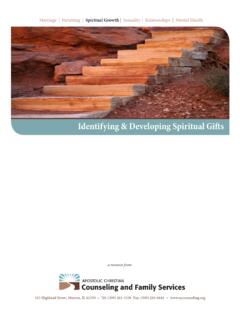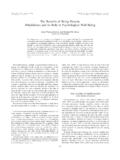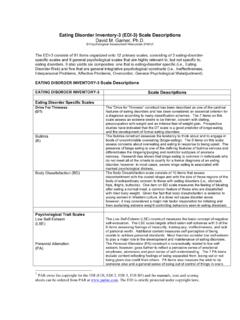Transcription of Scientific and Religious Beliefs about the Origin of Life ...
1 Universal Journal of Educational Research 5(6): 995-1007, 2017 DOI: Scientific and Religious Beliefs about the Origin of Life and Life after Death: Validation of a Scale Jes s Silva Bautista, Venazir Herrera Escobar*, Rodolfo Corona Miranda Faculty of Higher Education Zaragoza, National Autonomous University of Mexico, Mexico Copyright 2017 by authors, all rights reserved. Authors agree that this article remains permanently open access under the terms of the Creative Commons Attribution License International License Abstract The variety of explanations to questions about the Origin of life, life after death or about the role itself of being in the world are built on the rational reflection that integrates the ideology of human beings as well as less rational practices and more emotional ones than in the whole nourish what has been called " Beliefs ". Therefore, the aim of this study was to construct an instrument to measure Beliefs about the Origin of life and life after death.
2 A scale with a Likert 5-point response type was made up of 52 reagents; it was applied to 913 people of the Metropolitan Zone of Mexico City to obtain their psychometric characteristics, all whose schooling was either basic or an academic PhD degree. To identify the discriminative power of each test item, internal consistency, exploratory factor analysis and Pearson's correlation, data was analyzed using SPSS version 21. The final scale was formed by 48 reagents distributed in 4factors that threw a Cronbach Alfa of In conclusion, these results reveal a valid and reliable instrument as well as a useful tool for studying the phenomenon of the Origin of life and life after death. Keywords belief , Behavior, Scholarship, Science, Religion 1. IntroductionIn his need to find an absolute and clear explanation in this world, the human being is immersed in a process of personal search and growth, in which he creates his own vital project based on his relationship with his existence and his conditions of lifetime.
3 Regardless of culture, age, race, sex, profession or educational level, every human being is always in the need to confront certain universal conditions of existence, from there to create his own particular project of life. At the same time that he is part of the world he is also a being capable of constituting the world, because it him the one who interprets and gives meaning to it [ 1]. In this sense, the variety of explanations to questions about the Origin of the universe, human nature, life after death or about the very role of the being in the world is constructed from the rational reflection that integrates the ideology of the human being as well as less rational and more emotional practices that feed what have been called Beliefs ; in such a way, that throughout the history the human being has generated a series of answers of Religious , philosophical and Scientific [2].
4 When the psychosocial development of the human being is studied within his environment you will find that various factors may influence his behavior, one of the most important factors is precisely the Beliefs system. Beliefs have played a determining role in the development of mankind [3] from the primitive man who bestowed upon the unknown divine forces, the judgments of the Holy Inquisition in the Medieval Age, the impact that provoked the conviction that Earth was round about the belief of a Flat Earth and many other Beliefs that sustain the behavior of the human being. In this context, Beliefs represent the information that the person has about the object, which is attached to some attribute, is a hypothesis of probability or improbability in relation to the nature of the object and its relations with other objects.
5 They can be conceived as an initial subjective condition that explains a set of seemingly unrelated behaviors and by understanding the cause as the initial condition, therefore the belief is a cause of behavior. Thus, believing implies having a series of expectations formulated as hypotheses, which regulate the actions and relationships of the subject with their environment [4,5,6,7]. As assumptions of our understanding of the world, for Villoro [7] the Beliefs can be understood under two conceptions. The first refers to belief as a mental occurrence, that is to say, "(..) it is not about something present in perception or memory, but about what is represented in judgment .." ( ). The second conception corresponds to belief as disposition: (..) a provision is not an occurrence. Occurrences are directly observable, although they may be private or public.
6 They are expressed in statements that narrate situations, 996 Scientific and Religious Beliefs about the Origin of Life and Life after Death: Validation of a Scale data or facts, in sentences that describe something that happens (..). Provisions are not observable properties of objects, but characteristics that I have to attribute to them to explain certain occurrences ( ). Beliefs operate as guides to action that enable the person to respond in one way and not another; However, they are not always expressed in actions, but, only if a certain circumstance arises, will the person behave in a way that supposes the existence of a dispositional state to act [7]. Being judgments and evaluations that people make of themselves and the world around them, Beliefs act as filters through which information from the inner and outer world is integrated and contrary to what might be thought, are not derived of environmental or behavioral evidence, but rather precede it and give it meaning.
7 In The Oxford Companion to Philosophy [8] it is argued that because Beliefs imply a deploying of concepts, unless the individual understands what a particular object is, it may or may not believe in it. During the 1990s, Pajares [9] stated that "(..) the belief is based on evaluation and judgment (..)"( ), which results in a vision of the belief referred to the judgments of an individual on the true or false of a proposition, a judgment that can only be inferred from a collective understanding of what is being said, pretending to do and doing. At this point, it is important to evaluate each component to have confidence that the inferred belief is a reasonably adequate representation of that judgment. In this respect, Llinares [10] points out that "(..) an important aspect is that Beliefs cannot be directly observed or measured, therefore, they must be inferred from what people say, pretend and do"( ).
8 Taking into account the characteristics cited by these authors, Pepitone [3] proposes four basic functions that encompass some of these elements. The first function alludes to an emotional part, the Beliefs serve directly to handle the emotions; the second function has a cognitive character, where they give cognitive structure, which provides a feeling of control over life; the third refers to a sense of morality, here the Beliefs function to regulate the distribution of moral responsibility between the person and the group; finally, the group function, where Beliefs promote group solidarity by giving people a common identity. On this latter function, Pajares [9] adds that these provide elements of the structure of values, order, direction and shared values, which is why they acquire emotional dimensions and resist change.
9 Beliefs encompass all ideas about which there is no secure knowledge, but which are trusted enough to act accordingly; should be relatively stable, otherwise the human being in the face of a confused domain and the usual cognitive and information processing strategies do not give good results, may face uncertainty in not being able to recognize relevant information and appropriate behavior to this phenomenon) [9,11,12,13]. For people, to change their Beliefs to accommodate new ones will require not only developing new behaviors, but also abandoning the well -established and apparently successful ones, which can lead to disorientation and frustration. In view of this, Myers [14] argues that the human being constantly examines and justifies how the theories that guide his life may be true, thus closing, to the new information that defies his Beliefs .
10 Beliefs "(..) have an adaptive function and help the individual to define and understand the world and himself" (p. 325). For this reason, they can be seen as the major determinant of human behavior, although in a specific time and context [15]. The continuous search for an explanation that helps to understand the behavior of the human being has been a permanent work, because, the answers to the question of why he behaves as he does part from the notion that one s Origin , nature or character, as well as of the characteristics that are of his own or not [2, 16]; of this, arises the need to be able to explain two fundamental events in the life of the human being: the Origin of the Life and the Life after the Death. The Origin of Life The Origin of Life has been explained mainly through a series of Religious , philosophical and Scientific answers [2], whose base is in the Beliefs system that the human being possesses.

















